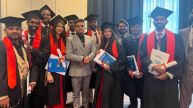Professionals are gearing up to master the art of writing codes as codes are a prerequisite to automation testing. Well-rounded professionals who are making a mark in the industry are upskilling, including this facet of Automation in their CV as well. There is an upsurge of using low code to no code testing platforms alongside continuous testing of DevOps with emphasis in security testing
Raghavender Reddy Vanam, Senior QA Automation Engineer and strategic QA leader takes a close look at the industry and analyses the driver trends. Raghavender’s rich experience and expertise in driving enterprise cloud transformations and modernizing actuarial, financial, and data-intensive systems puts him at the forefront of the industry.
Testing On Fingertips
IEEE Senior Member, published author and frequent speaker-judge at global QA and technology conferences, Raghavender is a quality assurance leader known for bridging the gap between business, IT, and regulatory stakeholders. At the TestingMind Conference, Raghavender’s talk, “Pioneering Intelligent Test Automation for Modern Applications”, addressed the challenge of achieving frequent deployments without compromising quality.
He explained about solutions such as self-healing tests, modular components with high reusability, and risk-based testing. Reinforcing this future-forward theme, the keynote session “Product Quality in the Age of AI” given by another expert speaker, further underscored how performance, trust, and adaptive test strategies remain critical pillars in this evolving landscape. Raghavender cited, “With increased focus on performance and trust, testing of various functions and modules is pretty much here to stay. Upgradation and technology adoption are the name of the game”.
Surge In QA Automation Professionals
As technology keeps evolving and growing there is an urgent demand for skilled QA automation professionals. With deep expertise in leading cross-functional teams through intricate AWS cloud migrations, Reddy consistently aligns organizational practices with QA-first architectures and evolving regulatory frameworks.
Raghavender said, “Some of the areas that these professionals are required to focus is enhancing speed and quality through better processes and early testing”. He added, “For the next two- three years this surge will continue and QA Automation will continue being a rewarding career path. This also means that there will be plenty of innovation and upgradation and professionals will have to keep up, we will need to continue with our learning journey”.
Spotlight On Automation Tools
Some of the emerging Automation testing tools in 2025 are Playwright, Cypress, Selenium, Appium and TestComplete. Raghavender confirmed, “Yes tools like Playwright and Selenium are very popular these days. These tools have different capabilities like efficient cross -browser testing, speed and dependability. Tools like Cypress, Appium, and Katalon Studio are also gaining ground with their range of offerings. While professionals may have fortes and favourites, you can be stuck with one. It is imperative to be updated on most of these tools so as to meet ever evolving demand”.
Demonstrating thought leadership in the industry, Raghavender presented at the 6th INCET 2025. This work highlighted the anomaly detection using deep learning QA techniques to enhance software reliability and enable proactive defect identification — reinforcing his commitment to innovation and operational excellence in quality engineering.
AI Domination
AI percolation and advancement is posing a threat across industries and jobs. Some are directly impacting while others not so much. AI is creeping up as a job loss threat and Automation as an industry is no exception. However, a confident Raghavender opined, “AI has been a challenge, I will not deny but it cannot replace sound professionals.
QA as a vocation will not be wiped out. Yes, AI has a sizable impact on software testing, fixing bugs, enhancing testing frameworks, certain self-healing modules and easing out repetitive tasks are the areas hogged up by AI. But a sound professional will make use of these to their advantage, converge technologies, hyper automate wherever required, use it as automation glue. Critical thinking still remains a human affair, till it is not. We have still not reached there. Hence the way forward for professionals is to learn, apply, innovate and repeat”.











